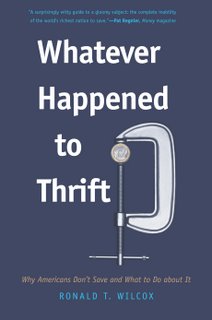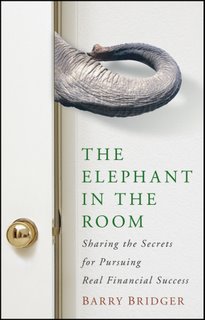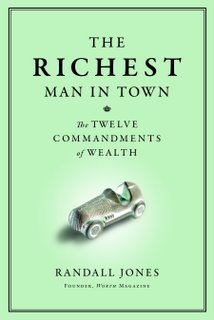Heck, I even, after mulling it over for about 30 min., put back a cute purse in T.J. Maxx the other day and decided to just go home and use one of the thousand other purses I already have (How's that for thrift?). Why did I have this moment of wallet consciousness? Because the $49.99 I could've laid down on that accessory will buy a few days of meals. And I think more about every single purchase I make now than I did, say, a couple of years ago, before my retirement savings got cut in half just like everyone else's ... But enough about me!
These three books, reviewed in brief by The Associated Press Personal Finance Team, take a look at a new attitude toward wealth.
Bookshelf: Is the richest man in town thrifty?
By The AP Personal Finance Team
The "live for today" attitude that helped run up credit card balances and drive down savings accounts is getting a new look these days as Americans struggle through the recession.
Two new book releases present arguments about how to change that attitude, while one offers insight into the tactics wealthy people across the country used to reach their goals.
__________

TITLE: Whatever Happened to Thrift: Why Americans Don't Save and What to Do About It
AUTHOR: Ronald T. Wilcox
PUBLISHER: Yale University Press
PRICE: $20 (paperback)
SUMMARY: Wilcox, a business professor at the University of Virginia, examines the rational and irrational reasons underlying Americans' failure to adequately save, particularly among the poor. Coming amid a recession, the book isn't uplifting — it shows how many of us are ill-prepared to support ourselves in retirement. Wilcox also demonstrates that our shortcomings pose national challenges, arguing that savings are essential to economic growth. Rather then dwelling solely on doom and gloom, Wilcox offers public policy proposals to encourage thrift, as well as tips for boosting household savings. He also presents suggestions for corporate executives to improve employee savings plans. And while he argues the credit card industry and corporate America share plenty of blame for our collective savings failures, he advises to look at ourselves first.
QUOTE: "Truthfully, we are at the root of the problem; for the most part, it is not the companies, the government, or some evil spirit that possesses us and causes us to spend too much. We are just fallible human beings operating in the world we live in as Americans."
— Mark Jewell
__________
TITLE: The Elephant in the Room: Sharing the Secrets for Pursuing Real Financial Success
AUTHOR: Ba
 rry Bridger
rry BridgerPUBLISHER: Wiley
PRICE: $19.95 (hardcover)
SUMMARY: Bridger takes an unusual approach by creating a fictional narrative involving a man named Michael Davidson and his wife, Jennifer, talking with his wise, prosperous aunt about their financial troubles. This short book details the characteristics needed for financial security.
Unlike most personal finance books, there are no charts, graphs or worksheets, and no specific advice for budgeting, money management or paying down debt. Rather, the author focuses on the attitudes, values and behaviors needed to transform a financial life from month-to-month anxiety to well-planned security.
Bridger's aim is to get readers thinking beyond the numbers and focusing on their goals, and to understand that the key is not how much they earn, but how they spend it.
QUOTE: "Everything we do affects the way we earn money, save money and spend money. Everything we believe and feel affects the way we act. Those behaviors, the way we act, the things we do, affect our financial future."
— Eileen AJ Connelly
__________
TITLE: The Richest Man In Town: The Twelve Commandments of Wealth
AUTHOR: W. Randall Jones
PUBLISHER: Business Plus, an imprint of Hatchette Book Group
PRICE: $25.95 (hardcover)
SUMMARY: Worth magazine founder Randy Jones set out to learn the secret to becoming rich. So he interviewed 100 self-made business people prominent in communities large and small across the U.S.

Some, such as Bill Gates, Michael Dell and Carl Icahn, are well known, while others are not quite household names. But Jones found they all share certain traits.
Jones uses an easy-to-read style to present those traits as 12 commandments readers should follow to build their own fortunes. Sprinkling in quotes and insights from his interview subjects, philosophers and famous writers, he directs readers to do things like "Get addicted to ambition" and "Moor yourself to morals," and above all, not to pursue money for the sake of money.
Borrowing his title from the toast at the end of the movie "It's a Wonderful Life," he maintains that a rich life is one that includes personal fulfillment and contributing real value to the world, not just the accumulation of dollars.
QUOTE: "There are people who have loads of money, and there are people who are rich. There is a decided difference between them."
—Eileen AJ Connelly
No comments:
Post a Comment